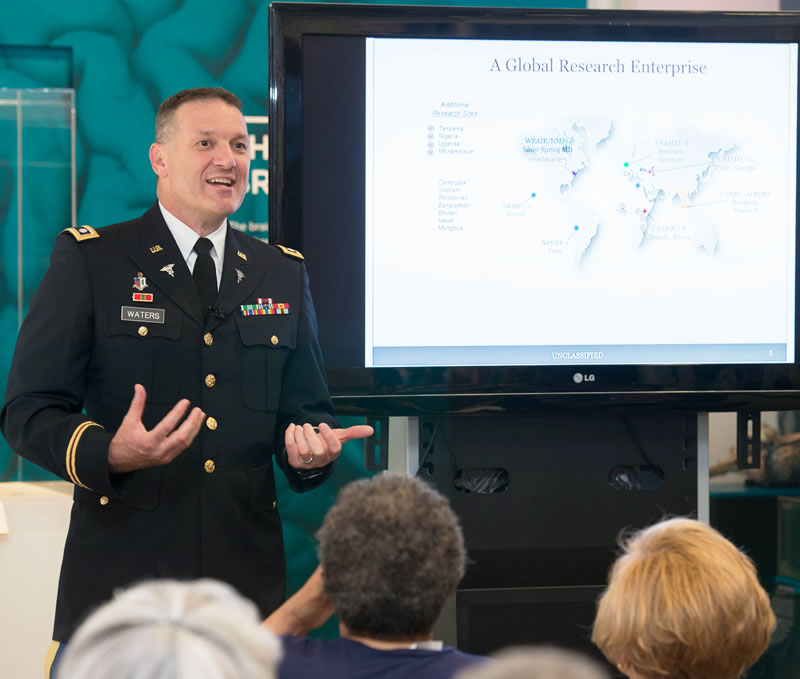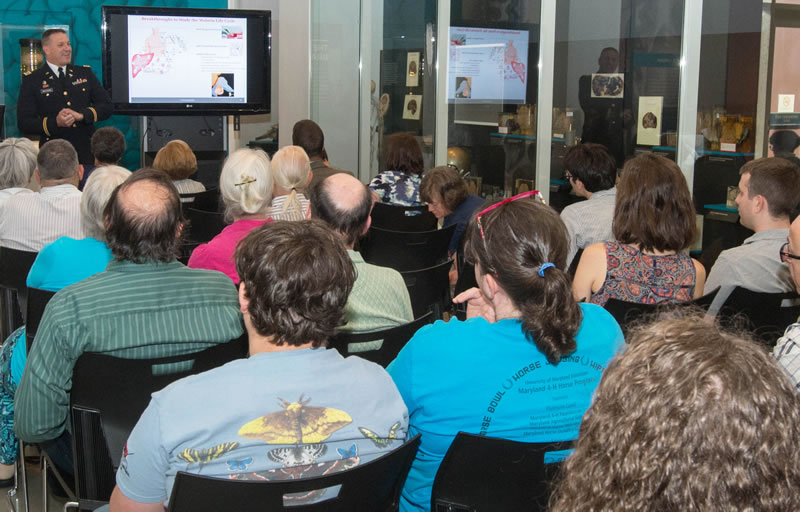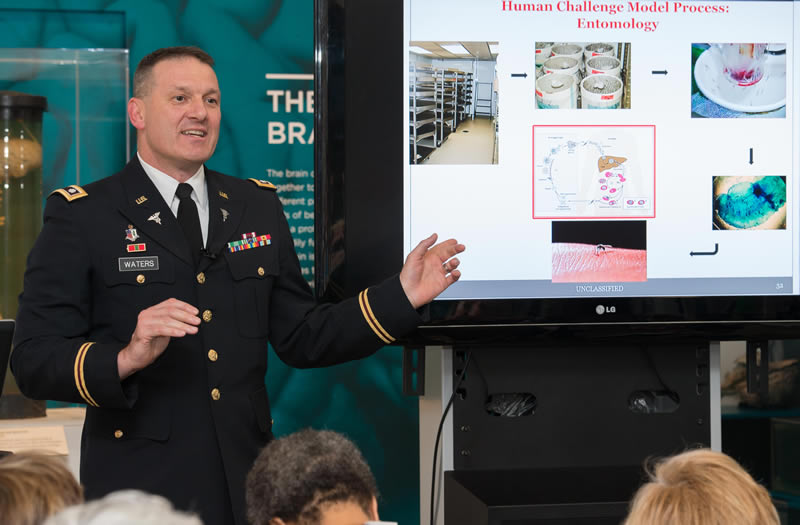Army Research Lab Leads Antimalarial Pharmaceutical Research Mission
By Lauren Bigge
NMHM Public Affairs Coordinator
Malaria is an on-going threat to the health of American service members in their missions abroad, U.S. Army Lt. Col. Norman Waters, Director, Military Malaria Research Program at the Walter Reed Army Institute of Research (WRAIR), told the National Museum of Health and Medicine's Medical Museum Science Café audience on June 27. Yet the constant development of antimalarial drugs and vaccines at WRAIR ensures that contemporary U.S. armed forces are not devastated by the disease as their predecessors were during wars of the past.
"Our mission is to protect the warfighter; soldiers, Marines, Coast Guard, anyone out there wearing the uniform on the frontlines for national security," Waters said. "We think about malaria, we think about war; they go hand in hand. This goes back earlier than the Revolutionary War."
The malaria parasite from a mosquito is the greatest threat during overseas missions, especially in Africa. There are five different malaria species that infect humans. Currently about 100 cases of malaria infection are occurring in the military per year. Waters estimated 500,000 deaths, mostly children, occur per year in Africa due to malaria. Repeated infection does not lead to long lasting immunity.
NMHM offered a temporary exhibit– "The Battle Against Malaria" – in May and June 2017, featuring artifacts from the museum's collection related to the prevention and treatment of malaria. Specific antimalarials or a future vaccine could be used to prevent malaria infection, while treatment of a malaria infection requires strong and effective antimalarial drugs.
The temporary exhibit included models that showed the incubation cycle of four strains of malaria parasites in human red blood cells, as well as mosquito netting and medication bottle samples that documented efforts made to combat malaria at that time.
The museum's interests in vector-borne diseases reaches back to the late 19th century. Maj. Walter Reed was curator of the Army Medical Museum (today's NMHM) from 1893 to 1902, when he led a team that determined mosquitoes were the vector that transmitted yellow fever.
Based on the research results at WRAIR in Silver Spring, Md. (a neighbor to NMHM at the Fort Detrick-Forest Glen Annex), it will be at least five years before a licensed, first-generation malaria vaccine becomes available. As of 2017, lead vaccine candidates only moderately protect against selected malaria strains. Given the likelihood of American service members deploying to malaria-endemic areas in the future, the Department of Defense (DoD) remains vigilant in developing pharmaceutical countermeasures.
Waters explained that the parasite adapts, soon becoming resistant to the antimalarial pharmaceuticals available. “We'll always have to develop the next generation of antimalarial drugs. The threat is 200 million infections per year, worldwide. We're going after the threat. That threat is real."
"For DoD, we like to kill the parasite before it gets into the blood and actually causes disease," he said.
"It's not a simple process," Waters said of the antimalarial pharmaceutical pipeline, noting that millions of compounds are in the early discovery process. "A lot of tests go into developing and pushing the compound into the clinic."
Due to the malaria parasite's rapid development of resistance to antimalarial pharmaceuticals on the market today, WRAIR's product pipeline must be continuous. Scientists start the process again immediately once a compound's efficacy has been proven, and therefore can be released as a new medication.
Controlled human malaria infection trials approved by the FDA have been underway at WRAIR since 1986. Vaccinations begin in August 2017 for the world's largest controlled malaria infection trial, consisting of 160 volunteers. They will be testing the most advanced malaria vaccine, which, in previous phase 3 clinical trials, resulted in a 56 percent reduction in clinical malaria and a 47 percent reduction in severe malaria episodes, in children up to 17 months old in seven African countries. This new clinical trial, now underway at WRAIR's Clinical Trials Center, will confirm results from an earlier small trial showing that additional doses of the vaccine may greatly improve efficacy.
"All of those antimalarial drugs developed [by WRAIR] to protect the warfighter are out there on the market," Waters added. "It's not only soldiers and sailors using them. The general public is using the same compounds."
"The U.S. military has been in the forefront of malaria research since the mid-1800s, so it was a privilege to hear from Lt. Col. Waters about the current efforts by the Military Malaria Research Program to continue to wage war on this disease through development of a vaccine and improved treatments," said Andrea Schierkolk, NMHM public programs manager.
NMHM's Medical Museum Science Cafes are a regular series of informal talks that connect the mission of the Department of Defense museum with the public. NMHM was founded as the Army Medical Museum in 1862 and moved to its current location in Silver Spring, Maryland, in 2012. NMHM is an element of the Defense Health Agency. For information on upcoming events, please call 301-319-3303 or visit www.medicalmuseum.mil.
Click any photo to view larger version






